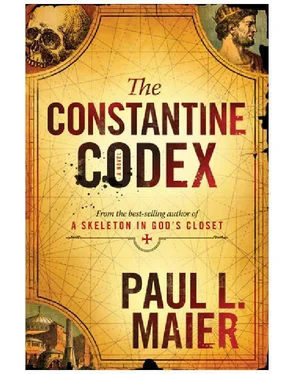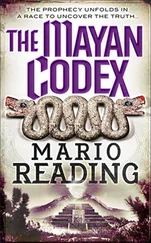Paul Maier - The Constantine Codex
Здесь есть возможность читать онлайн «Paul Maier - The Constantine Codex» весь текст электронной книги совершенно бесплатно (целиком полную версию без сокращений). В некоторых случаях можно слушать аудио, скачать через торрент в формате fb2 и присутствует краткое содержание. Жанр: Триллер, на английском языке. Описание произведения, (предисловие) а так же отзывы посетителей доступны на портале библиотеки ЛибКат.
- Название:The Constantine Codex
- Автор:
- Жанр:
- Год:неизвестен
- ISBN:нет данных
- Рейтинг книги:5 / 5. Голосов: 1
-
Избранное:Добавить в избранное
- Отзывы:
-
Ваша оценка:
- 100
- 1
- 2
- 3
- 4
- 5
The Constantine Codex: краткое содержание, описание и аннотация
Предлагаем к чтению аннотацию, описание, краткое содержание или предисловие (зависит от того, что написал сам автор книги «The Constantine Codex»). Если вы не нашли необходимую информацию о книге — напишите в комментариях, мы постараемся отыскать её.
The Constantine Codex — читать онлайн бесплатно полную книгу (весь текст) целиком
Ниже представлен текст книги, разбитый по страницам. Система сохранения места последней прочитанной страницы, позволяет с удобством читать онлайн бесплатно книгу «The Constantine Codex», без необходимости каждый раз заново искать на чём Вы остановились. Поставьте закладку, и сможете в любой момент перейти на страницу, на которой закончили чтение.
Интервал:
Закладка:
He laughed. “Is there any question?”
“You bet there is!” Jon glanced out the windows and saw an even larger media crowd outside. “Uh-oh, time to throw them a fish. Marylou, let’s work up a press release that says I not only accept but look forward to the debate, since al-Rashid will be an excellent opponent, and that it will take place within the next three months at a location still to be determined. Okay?”
“Got it.”
“Then bring it back here and we’ll check it out.”
This set the pattern for other such meetings to come. An international debate like this might come off with apparent technical brilliance-or not!-which only masked the immense amount of preparation involved. Jon’s “cabinet” met twice a week and exchanged hundreds of e-mails with Cairo until everything was nailed down. A long checklist was involved.
The hardest nut to crack was the location. Al-Rashid wanted a venue with a large Muslim population, in order to demonstrate his theology of loyalty yet flexibility within Islam. For obvious reasons, Jon preferred a large Christian presence. They exchanged suggestions for neutral sites or those with something of a religious balance between Muslims and Christians, like Beirut. But Beirut was finally rejected by both in view of the violence that so often and so tragically disrupted that beautiful city.
They finally agreed on a place that brought gasps to Christians but smiles to Muslims: Istanbul, Turkey. Had Jon lost his senses, agreeing to a location that was overwhelmingly Muslim? Not really, he claimed. Turkey was the most Westernized of the Muslim countries and a secular-not religious-state, thanks to Mustafa Kemal Ataturk, the father of modern Turkey. Geographically, too, it lay almost at the interface between Muslim and Christian lands.
But it was a third reason that had finally convinced Jon. He received a letter from no less than “the eastern pope,” His All Holiness, Bartholomew II, Archbishop of Constantinople, New Rome and Ecumenical Patriarch, pleading with Jon to have the debate in Istanbul. The Eastern Orthodox Christians there were a small minority and needed all the recognition they could get in that quarter of the world. Although Jon’s advisers were against the idea, he was adamant. The debate would take place in Istanbul. Once that was settled, the other details quickly fell into place and were outlined in a forty-page document. Specific Location: Hagia Sophia, the Church of Holy Wisdom, constructed by the Byzantine emperor Justinian in the sixth century, now a public museum. Date: September 3, two months away. Time: 9:30 a.m. local time, with as much of the afternoon as necessary. Audience: Exactly half Muslim and half Christian; ticket distribution to be administered by each side, independent of the other. Seating: Christians will occupy the western half of the nave, Muslims the eastern half. Moderator: Two will serve concurrently: the Ecumenical Patriarch of Constantinople and Mustafa Selim, the Muslim mufti of Turkey. Translation: Simultaneous translations of the debate will be provided in Turkish, Arabic, English, Greek, Farsi, French, German, Spanish, Italian, Russian, and Chinese. Media Coverage: Live radio and television coverage will be permitted. All cameras and all representatives of the press will be limited to the second-story galleries of the basilica. Publications: All official printed materials resulting from the debate, whether in pamphlet or book form, will be carefully checked for accuracy by both sides against master audiotapes of the debate. Video: Similarly, all DVD reproduction will be mutually approved, and all proceeds from sales of any media products subsequent to the debate will be shared equally by the Muslim and Christian parties involved. Security: Metal and nitrate detectors will be in place at all entrances to the basilica, and no packages will be permitted inside. The government of the Republic of Turkey will have final responsibility for security and will provide same at both the civil and military level.
A sheaf of many more pages covered everything from prohibition of camera flash to how many porta-potties should augment the regular toilet facilities at Hagia Sophia.
In the weeks following, the international media wanted details on every aspect of the debate plans. Apparently they could not leave the story alone. Some of the press reports overdid it, of course. London’s News of the World brought out a headline-it must have been a slow news day, Jon opined-bellowing, MOST IMPORTANT CHRISTIAN-MUSLIM CONTACT SINCE THE CRUSADES! But even the more responsible media often used phrases like “could be historic,” “rather unprecedented,” “huge potential consequences,” and the like.
“All in all, it promises to be quite the event,” Shannon commented after reading through one day’s particularly intense news coverage.
“Mm-hmm,” Jon agreed, “although quite the detour for our research plans.”
Shannon attended most of the ICO cabinet meetings at Jon’s side, and both were aching to report her find at Pella and its significance. But they had to be absolutely sure about the physical properties of the five brownish leaves to ward off any potential claims of forgery. In fact, fraud had reared its ugly head with some frequency in the world of antiquities of late. Unfortunately this could taint genuine finds as well, prompting a “guilty until proven innocent” attitude among both professionals and laity. Inevitably, the more important the discovery, the greater the temptation to call it a forgery.
Shannon flew to Washington, D.C., to deliver one of the leaves to Sanford McHugh at the Smithsonian. “Sandy” had helped them with determinations of authenticity before, and he promised Shannon to have the results of his tests in about two weeks.
For his part, Jon, with Shannon’s permission-it was her find, after all-cut off a small corner of one of the leaves, put it in a lead pouch, and air-expressed it to Professor Duncan Fraser at the radiocarbon labs of the University of Arizona in Tucson. Fraser and his TAMS apparatus-tandem accelerator mass spectrometer-had provided crucial assistance to Jon and Shannon several years earlier through his meticulous dating of a crucial manuscript by carbon-14 analysis.
And yes, Jon did have an ethical problem here. He should first have asked permission of the priest at Pella. But cui bono? To what good? If the priest had said yes, all was in order. If not, one of the best testing methods for an ancient manuscript would be denied. The chances that the priest would even notice a small cut from one corner-no writing whatsoever involved-were about one in a thousand. And even if he had an eagle eye and did notice it, he would quickly see that no damage had been done. It seemed a justified cut.
Jon and Shannon had a larger problem with his agreeing to Istanbul as the site for the debate. With Turkey 98 percent Muslim, she thought it was almost suicidal, especially in view of the fatwa still lingering over his head. Nor was the CIA, which quickly caught wind of it, especially pleased. If Jon would not change his mind, they wanted to review all security procedures in Istanbul and could not promise his safe return.
For his part, Jon defended his decision by pointing out that Turkey was Sunni, not Shiite, territory; he was debating the very person who had called for the lifting of his fatwa; and strict security measures would be employed. “It’s a done deal, Shannon,” he said, “a dead issue.”
Her voice quivered as she warned, “I hope your words aren’t prophetic!”
Jon just stood there, wondering if he might not have made a better choice of words. It was a bad moment.
Maybe things could be salvaged with a little levity. “Well, honey,” he said, “don’t forget that third reason I agreed to Istanbul: the Eastern Orthodox Patriarch begged me to come to Turkey, which wins me some points with him.”
Читать дальшеИнтервал:
Закладка:
Похожие книги на «The Constantine Codex»
Представляем Вашему вниманию похожие книги на «The Constantine Codex» списком для выбора. Мы отобрали схожую по названию и смыслу литературу в надежде предоставить читателям больше вариантов отыскать новые, интересные, ещё непрочитанные произведения.
Обсуждение, отзывы о книге «The Constantine Codex» и просто собственные мнения читателей. Оставьте ваши комментарии, напишите, что Вы думаете о произведении, его смысле или главных героях. Укажите что конкретно понравилось, а что нет, и почему Вы так считаете.












